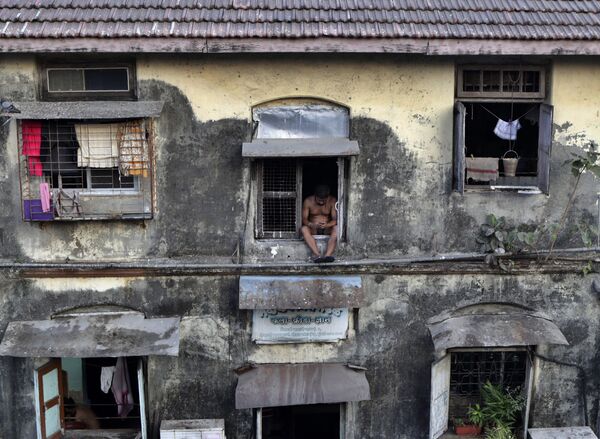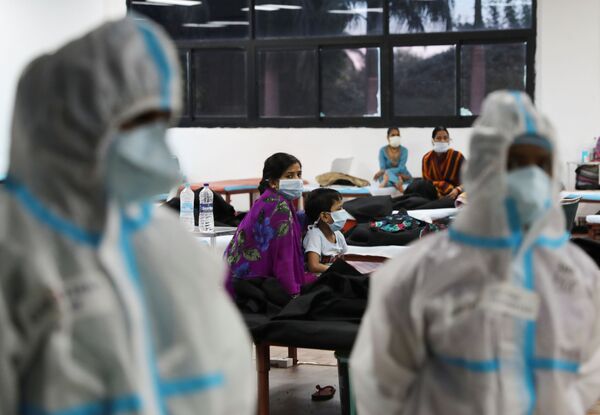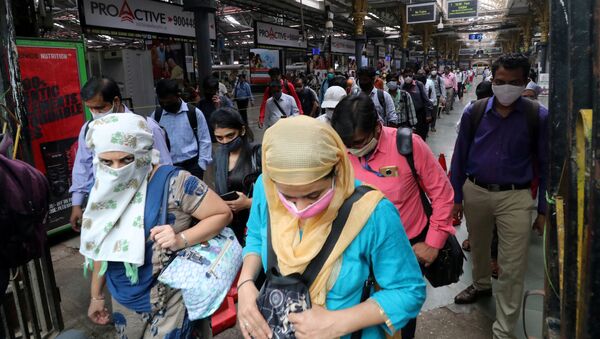Exactly six months after India's national lockdown started, and despite the gradual elimination of the measures, life has still not returned to what it was during the pre-lockdown period amid many curbs and new precautionary rules which are still in place.
The latest guidelines issued by the federal Home Ministry on 29 August mandate that schools and colleges remain closed until 30 September: Indians still lack access to international commercial flights, cinemas, swimming pools, entertainment parks and other places.
Sputnik talked to people from various walks of life to gauge how the lockdown and pandemic have changed their lives and how they were able to survive without social engagements.

Ashwini Bhatnagar, the author of several best sellers, said that when the lockdown was announced, he was a bit panicky.
“The lockdown stranded us in every possible way -- physically, emotionally, financially, and professionally. I felt I had been suddenly stripped, I felt vulnerable, exposed and even abandoned. It was now each person to himself. My carefully crafted network of human ties disappeared in a moment. I was alone, I was lonely, I was afraid,” Bhatnagar told Sputnik.
Bhatnagar, who lives in NOIDA, a satellite city in the national capital region, said the anxiety about the deadly potential of the virus disturbed even his eating and sleep cycle. He could not concentrate on writing as his mind was always elsewhere.
“I was living in constant dread of a ferocious invisible predator. The dread killed my enthusiasm to create anything new. Tomorrow, suddenly, seemed so distant. The light, it seemed, had gone out and I was groping fearfully in the thick corona haze desperate to anchor myself in a fluid situation,” reminisced the author.
Quality Time With Family
Unlike Bhatnagar, freelance journalist Aswini Boruah from the city of Guwahati in the north-east of India was happy that he could spend more time with his seven-month-old grandson.
He said that although the announcement of the lockdown affected his spirit, he faced it boldly.
“He [the grandson] made me a child and we enjoyed the lockdown period, despite worrying mostly about the three-member family of our elder son, living in another state,” Boruah told Sputnik.
Film and Television actor Meghana Kaushik also admitted that due to the national lockdown, she has been able to spend a lot of time at home with her parents, something which she had been unable to afford for several years.
“I had gone back to my hometown in Jaipur for two days and then suddenly a lockdown was announced. So, I was literally stuck at my parents' place with no clothes of mine, no laptop, no basic toiletries - forget beauty products and the works.”
“Workwise , it has been downhill. Since I was without a laptop, I had to let go a lot of work that was coming my way,” Meghana, who also had a brief stint in the media, told Sputnik.

Looking back at the six months at home without work, Meghana suggested adopting a middle ground to resume life.
“It’s basic nature for humans to fight our problems and then move on with learning and experiences. Although I doubt that we will be able to change everything we have been doing for so long,” she said philosophically.
Rakhi Dubey, a Supreme Court of India lawyer, said the lockdown was really stressful and full of panic.
“It was difficult to digest that I have to sit at home with no work and earnings, but expenses would continue,” she told Sputnik.
Professionally it was painful, said Dubey, who used to run between the chambers of judges to attend to cases.
“Judges have been really co-operative and accommodating. However, filing fresh matters has been really painful. Some court staff cooperated and understood the difficulty and the Covid situation. However, some just raised objections, one by one, making it really difficult to get relief for clients,” said the lawyer.
'COVID Taught Us Many Things'
Lockdown has really changed the life of every individual and all had to switch to the virtual world, she added.
“Covid taught us many things, but I would want to go back to the pre-Covid period, as we all are social animals,” she rued.
But for Mangal Dhobi, who pedals almost 35-km every day from an outlying semi-urban settlement with his wife on his back, to a residential colony for government employees in the centre of the national capital to work as an ironer, lockdown was the most difficult period in his life.
“We are five members in the family, me, my wife and three children. We iron clothes under a tree in the compound of a government colony and earn INR 700-800 daily ($9.5 to around $11.0). Once lockdown was announced, we had no source of income; even our reserves did not last for a week. We survived with the help of food packets distributed by charities,” said Dhobi.
For Ashwini Bhatnagar, the lockdown and social distancing in a way was good, allowing him to pursue his writings.
His latest, yet to be published book named ‘Dread’ has the Coronavirus and the dreadfulness it created among humans as the central theme, as described in the first chapter of the book.
“It was all over the world now -- lurking in the dark damp shadows of winter; stalking for hosts -- waiting for a breakthrough. It couldn’t fly on its own, it needed contact. What simple contact could do was visible in many parts of Europe -- Italy, Germany, France, Spain, you name it, and the new coronavirus ---COVID -19, as it had been christened—was there like a vengeful ghost sucking the life out of the lungs of the unwary.”
Modi Announces National Lockdown
In late March, Indian Prime Minister Narendra Modi announced a 21-day nationwide lockdown, putting the entire country into a standstill in order to stop the spread of the coronavirus.
"There is no other way to save ourselves from coronavirus but social distancing. If we want to be saved, the cycle has to be broken. Some people think that social distancing is only for those who have coronavirus. That's not right, social distancing is for every citizen," he said at the time.
The lockdown has subsequently been extended several times.
India has now confirmed more than 5.8 million cases, the second-highest rate in the world after the United States. 92,290 people have succumbed to the disease.




